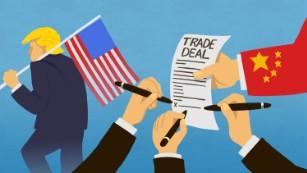Share
As U.S. Turns Isolationist, Trade Deals Move Forward Between Global Powers

Although many across the globe believe this lapse in United States global leadership on economic and social issues will pass, the world isn't sitting still while Trump and Republican leadership embarrass and set us back. In fact, many are reacting to Trump by accelerating their efforts to collaborate with other nations to improve their futures.
The European Union and Japan are close to sealing one of the largest trade agreements ever, a deal that could further isolate the United States as President Trump forges a protectionist path. The deal, which brings together two giants encompassing a quarter of the world’s economy, would be a potent symbol of free trade during a time of populist backlash over globalization.
The deal, which is expected to be signed in the coming weeks, also reaffirms the two powers’ commitment to the Paris climate accord, abandoned by the Trump administration this month.
While Japan and the European Union have been negotiating for years, Japanese officials have been eager to pick up the pace at trade talks in the aftermath of Mr. Trump’s decision to leave the Pan-Pacific trade deal.
As other nations work together on a mutually beneficial future, America falls behind. Hopefully the damage being inflicted can be made up when we get our nation back on track.
The rest of the world is moving ahead with trade alliances as the Trump administration pushes a nationalistic “America first” agenda. Mr. Trump has called for higher tariffs in a broad defense of American manufacturing jobs against low-cost imports. Just days into his presidency, Mr. Trump pulled the United States out of the 12-nation Trans-Pacific Partnership deal brokered by his predecessor, as he declared an end to the era of big multinational trade agreements.
“It puts the U.S. on the back foot,” said Joshua P. Meltzer, a senior fellow at the Brookings Institution and a former senior trade negotiator for Australia. Under Mr. Obama, he said, American businesses were on their way to improving their positions in the Asian and European markets. “But now, the E.U. is managing to move more quickly,” he said, with substantial benefits. European farmers, for example, could gain better access to the lucrative Japanese market. “It shows the world doesn’t stand still,” he added.
Europe has also been working with Canada:
European leaders have been filling the void as the United States pulls back. In February, the European Parliament ratified a deal with Canada. Chancellor Angela Merkel of Germany in particular has emerged as a leading proponent of open trade in the face of populist leaders calling for protectionist measures.
In addition, China is hard at work:
America’s nationalistic stance could also leave the door open for China to further its trade diplomacy. China, the world’s second-largest economy after the United States, has been pursuing its own ambitious deal with 16 countries in Asia and the Pacific, including Japan, an enormous group with more than three billion people.
Source: https://www.nytimes.com/2017/06/23/business/europe-japan-trade-deal.html
